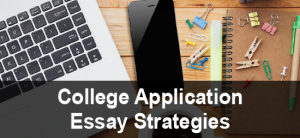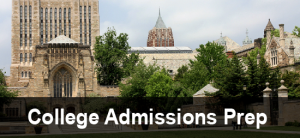A lot of students ask me if Coursera and edX classes can make a difference in the college admissions process and how they can make the best use of their summers, so that’s what I’m focusing on in this article.
As you probably know, Coursera and edX are two very popular online resources that grant you access to free courses taught by the professors at top colleges and universities. Coursera, like edX, offers a wide range of self-paced online courses, which you can start at any time. Click here to check out the self-paced classes that are currently available (as of May 2017).
Keep in mind that you don’t earn college credit for these classes.
However, they’re a great way to delve more deeply into subjects that intrigue you. College admissions officers are especially excited when they read applications by students who demonstrate an unquenchable thirst for learning and take the initiative to explore their interests outside the confines of the classroom.
One of the 10th graders in my program is fascinated with physics, computer science, and engineering. He’s taking the most challenging math and science classes at his school, but he wanted more, so he’s taking an edX Circuit Analysis course (offered through MIT).
FYI: Coursera is now offering certificates and specializations, which cost money. If there is some specialization you want to pursue and you’re willing to pay for access to the courses, that’s fine. However, these certificates and specializations are unlikely to make a difference in your college admissions process.
A UNIQUE STRATEGY FOR USING COURSERA & edX CLASSES
I’ve been reading Turning the Tide: Inspiring Concern for Others and the Common Good through College Admissions (a project of the Harvard Graduate School of Education), and one thing that I find especially striking is the emphasis on reflection.
Many of my most gifted, driven students are so busy with their classes and extracurricular activities that they have almost no time to contemplate what it is that they’re doing, why they find it so fascinating, and how these experiences connect to the life that they’re creating for themselves.
This lack of reflection can make the admissions process even more difficult.
Admissions officers don’t only want to know what you’ve done. They want to know why it matters to you.
So even though I’m suggesting that you continue pursuing your interests during the summer by engaging in self-directed projects or taking free online courses, I want to add a twist to the process.
The point isn’t just to accumulate more knowledge; it’s to process it.
This twist will add more meaning to your experience and help you use it to your advantage in the college admissions process.
HOW COURSERA HELPED ONE OF MY STUDENTS IN HER SUPPLEMENTAL APPLICATION ESSAYS
Many colleges ask you to write a supplemental essay describing your intellectual interests and how you plan to pursue them at their institution.
CLICK HERE to read my article on supplemental essays.
There’s a big difference between a student who talks about how she’s really excited to advance her knowledge about a particular subject and one who has already started taking cultivating expertise in this area.
Let’s consider the case of a student who found herself intrigued by epigenetics, which her science teacher just touched on in her lecture. This student was already involved in science-related extracurricular activities like Science Olympiad, but she hadn’t been involved in any events that were connected with epigenetics. She also wanted to learn more about this field and to figure out if it was something she wanted to pursue more fully in college.
My student decided to decided to take Epigenetic Control of Gene Expression (a free Coursera class), which she wound up loving. As she was working her way through the Coursera course, she started researching which professors at her reach, match, and safety schools were working in this field. Then she located and read some of their articles.
So the Coursera course wound up helping her accomplish a great deal. She. . .
- Took more action on her intellectual interests
- Clarified which specific aspects of epigenetics were most fascinating to her
- Used the Coursera course as a springboard for engaging in more targeted work, which also happened to make it much easier for her to stand out in her supplemental application essays and alumni interviews.
CLICK HERE to learn why you need to be able to talk about your intellectual interests in your alumni interviews.
HOW COURSERA & edX CAN MATTER IN
COLLEGE ADMISSIONS
Earlier, I mentioned how important it is to use your summer work to reflect on your experiences and develop perspective on them. You cannot provide college admissions officers with compelling insight into your life if you haven’t given yourself time to reflect on how your experiences are shaping who you are and who you are in the process of becoming.
So let’s consider how a few self-paced Coursera classes could assist you in this process of developing perspective on yourself.
Meister points out that “although taking, sharing, and viewing photographs has become second nature for many of us, our regular engagement does not necessarily make us visually literate.” Her course gives you behind-the-scenes access to “ideas, approaches, and technologies that inform their making” and shares with you a “variety of perspectives” on how photography has been used “as a means of artistic expression, as a tool for science and exploration; as an instrument of documentation; to tell stories and record histories; and as a mode of communication and critique in our ever increasingly visual culture.”
Why would you take this course and how could it make a difference in your college applications?
Well, maybe you’re constantly taking selfies and posting on Instagram and want to learn more about the history of photography. If the course changed the way you look at yourself and your photography, you could write about this experience in your Common App essay. CLICK HERE to access my free guide to Common App essay topics and tips.
Perhaps you’re thinking of majoring in history and want to explore it through the lens of photography. In a supplemental essay that asks you to describe your intellectual interests, you could include an anecdote about how this course opened your eyes to interdisciplinary approaches to studying history. CLICK HERE to get my tips on how to write great supplemental essays.
Professor Holsinger points out, this is a “unique and exciting introduction to the genre and craft of historical fiction,” which gives you the opportunity to “read classics of the genre, [and] encounter bestselling writers of historical fiction.” This could be a great course for those of you who really enjoy reading historical fiction but don’t know much about its origins and development. I love how there are video sessions with authors who tell you about their writing and research process and shed light on how they develop characters and plots.
How could you “use” this course in your college applications?
Let’s say that you’re applying to the University of Virginia and are considering majoring in English. You could use your experience in this course to respond to their supplemental essay (as of March 2016) that asks you to describe “what work of art, music, science, mathematics, or literature has surprised, unsettled, or challenged you, and in what way?”
Or maybe you’re really into computer science, but read historical fiction for pleasure. In your response to MIT’s prompt that asks you to “tell us about something you do for the pleasure of it,” you could write about historical fiction and the authors you’ve discovered in the course.
3. Effective Altruism with Professor Peter Singer of Princeton University
Have you spent a substantial amount of time volunteering and offering community service? Do you want to make a positive difference in the lives of others?
Professor Singer’s course can help you put your experiences and desires into a broader context. You’ll examine the “philosophical underpinnings” of the “simple but unsettling idea that living a fully ethical life involves doing the most good one can,” “meet remarkable people who have restructured their lives in accordance with it,” and “think about how effective altruism can be put into practice in your own life.”
How can a Coursera course on altruism help you stand out in the college admissions process?
Admissions officers are very interested in learning about your service.
The authors of Turning the Tide emphasize the importance of contributing to others and your “communities in more authentic and meaningful ways that promote in [you] genuine investment in the collective good and deeper understanding of and respect for others.” A course like Professor Singer’s could help you develop a stronger understanding of your service, and you could shed light on this expanded awareness in your Common App essay or the Additional Info section of the Common App.
YOUR NEXT STEPS
I hope this article got your creative juices pumping.
Want more help from me?
WAYS TO WORK WITH DR. BERNSTEIN!
Click here to learn how to schedule a private consultation with Dr. Bernstein.
Click here to learn more about Dr. Bernstein’s ongoing private college preparation and college admissions support.
Click here to learn about the online Get Yourself Into College® program.
Blog post image used: ©Sandralise/bigstock.com



